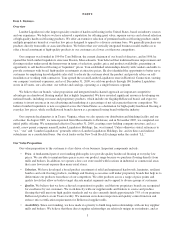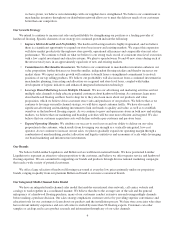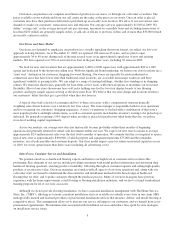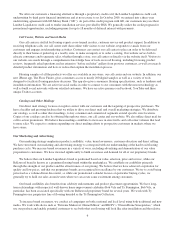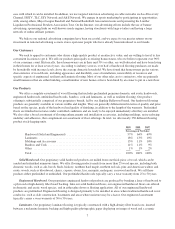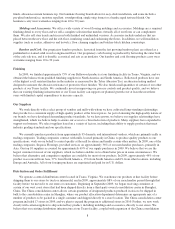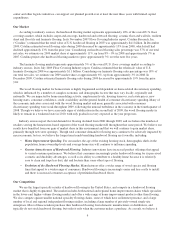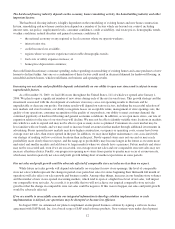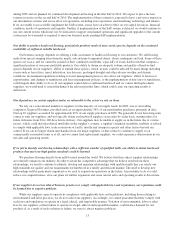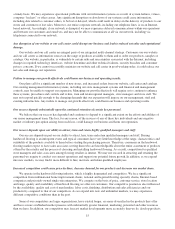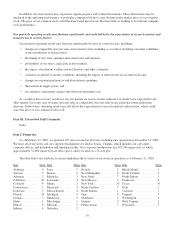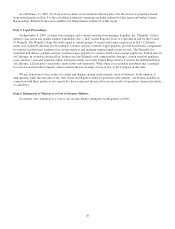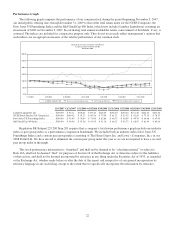Lumber Liquidators 2009 Annual Report Download - page 19
Download and view the complete annual report
Please find page 19 of the 2009 Lumber Liquidators annual report below. You can navigate through the pages in the report by either clicking on the pages listed below, or by using the keyword search tool below to find specific information within the annual report.during 2009 and are planned for continued development and testing in the first half of 2010. We expect to place the new
systems in service in the second half of 2010. The implementation of these systems is expected to have a pervasive impact on
our information systems and across all of our operations, including store operations, merchandising, technology and finance.
If we are unable to successfully implement the SAP system, it may have an adverse effect on our capital resources, financial
condition, results of operations and liquidity. Further, if implementation of the SAP system is delayed, we would continue to
use our current system which may not be sufficient to support our planned operations and significant upgrades to the current
system may be warranted or required to meet our business needs pending SAP implementation.
Our ability to produce hardwood flooring, particularly products made of more exotic species, depends on the continued
availability of sufficient suitable hardwood.
Our business strategy depends on offering a wide assortment of hardwood flooring to our customers. We sell flooring
made from species ranging from domestic maple, oak and pine to imported cherry, ebony, mahogany and teak. Some of these
species are scarce, and we cannot be assured of their continued availability, especially of exotic hardwoods that comprise a
significant portion of our more profitable products. Our ability to obtain an adequate volume and quality of hard-to-find
species depends on our suppliers’ ability to furnish those species, which, in turn, could be affected by many things including
events such as forest fires, insect infestation, tree diseases, prolonged drought and other adverse weather and climate
conditions. Government regulations relating to forest management practices also affect our suppliers’ ability to harvest or
export timber, and changes to regulations and forest management policies, or the implementation of new laws or regulations,
could impede their ability to do so. If our suppliers cannot deliver sufficient hardwood and we cannot find replacement
suppliers, we would need to curtail finishing of the relevant product lines, which could cause our operating results to
deteriorate.
Our dependence on certain suppliers makes us vulnerable to the extent we rely on them.
We rely on a concentrated number of suppliers for the majority of our supply needs. In 2009, one of our trading
companies, Sequoia Floorings, provided services on approximately 36% of our merchandise purchases, primarily in Asia.
Our top 10 suppliers accounted for approximately 69% of our supply purchases in 2009. We generally do not have long-term
contracts with our suppliers, and we typically obtain our hardwood supplies on an order-by-order basis, writing orders for
future deliveries from 90 to 180 days before delivery. Our suppliers may be unable to supply us in the future due to various
factors, which could include political instability in the supplier’s country, a supplier’s financial instability, inability or refusal
to comply with applicable laws, trade restrictions or tariffs, insufficient transport capacity and other factors beyond our
control. If we can no longer obtain merchandise from our major suppliers, or they refuse to continue to supply us on
commercially reasonable terms or at all, and we cannot find replacement suppliers, we could experience deterioration in our
net sales and operating results.
If we fail to identify and develop relationships with a sufficient number of qualified mills, our ability to obtain hardwood
products that meet our high quality standards could be harmed.
We purchase flooring directly from mills located around the world. We believe that these direct supplier relationships
are relatively unique in our industry. In order to retain the competitive advantage that we believe results from these
relationships, we need to continue to identify, develop and maintain relationships with qualified mills that can satisfy our
high standards for quality and our requirements for hardwood in a timely and efficient manner. The need to develop new
relationships will be particularly important as we seek to expand our operations in the future. Any inability to do so could
reduce our competitiveness, slow our plans for further expansion and cause our net sales and operating results to deteriorate.
If our suppliers do not use ethical business practices or comply with applicable laws and regulations, our reputation could
be harmed due to negative publicity.
While our suppliers agree to operate in compliance with applicable laws and regulations, including those relating to
environmental and labor practices, we do not control our suppliers. Accordingly, we cannot guarantee that they comply with
such laws and regulations or operate in a legal, ethical, and responsible manner. Violation of environmental, labor or other
laws by our suppliers or their failure to operate in a legal, ethical and responsible manner, could reduce demand for our
products if, as a result of such violation or failure, we were to attract negative publicity.
13


